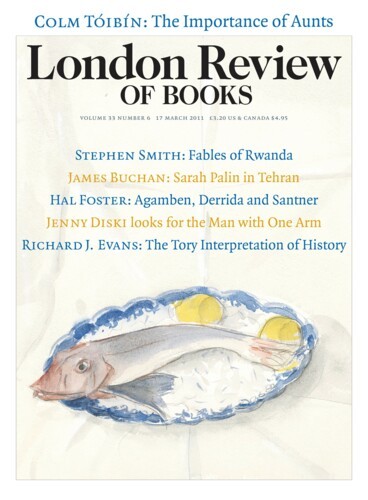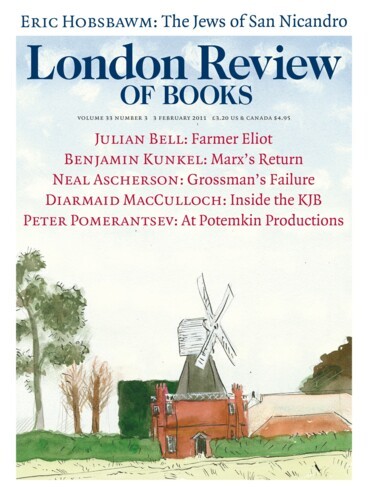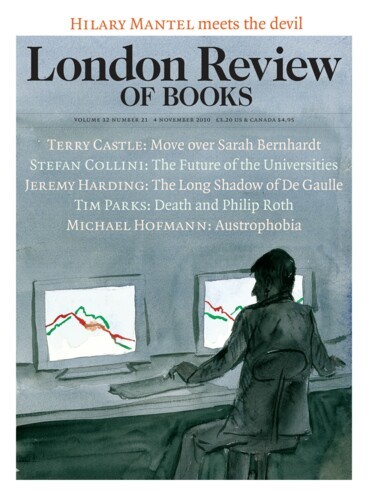Richard J. Evans
Richard J. Evans is Regius Professor Emeritus of History at Cambridge and a former president of Wolfson College. He is the author of numerous books, including The Pursuit of Power: Europe 1815-1914, Eric Hobsbawm: A Life in History and a three-volume history of the Third Reich.
The Wonderfulness of Us: The Tory Interpretation of History
Richard J. Evans, 17 March 2011
‘One of the under-appreciated tragedies of our time has been the sundering of our society from its past,’ Michael Gove announced at the Tory Party Conference last October. ‘Children are growing up ignorant of one of the most inspiring stories I know – the history of our United Kingdom. Our history has moments of pride, and shame, but unless we fully understand the struggles of the past we will not properly value the liberties of the present. The current approach we have to history denies children the opportunity to hear our island story. Children are given a mix of topics at primary, a cursory run through Henry VIII and Hitler at secondary and many give up the subject at 14, without knowing how the vivid episodes of our past become a connected narrative. Well, this trashing of our past has to stop.’
The Scramble for Europe: German Imperialism
Richard J. Evans, 3 February 2011
A few decades ago, historians searching for the longer-term roots of Nazism’s theory and practice looked to the ruptures and discontinuities in German history: the failed revolution of 1848; the blockage of democratic politics after unification in 1871; the continued dominance of aristocratic elites over a socially and politically supine middle class; the entrenched power of the traditionally...
‘Bloodlands’
4 November 2010
Who remembers the Poles? Between Hitler and Stalin
Richard J. Evans, 4 November 2010
‘Who, after all, speaks today of the annihilation of the Armenians?’ Adolf Hitler asked his generals in 1939, as he told them to ‘close your hearts to pity,’ ‘act brutally’ and behave ‘with the greatest harshness’ in the coming war in the East. It’s often assumed that in reminding them of the genocide of at least a million Armenians by the...
Podcasts & Videos
Anthony Wilks's film traces the connections between the events of Eric Hobsbawm’s life and the history he told, from his teenage years in Germany and his communist membership, to the jazz clubs of 1950s...
From Cholera to Coronavirus
David Runciman and Richard J. Evans
David talks to the historian Richard J. Evans about the history of cholera epidemics in the 19th century and what they can teach us for today.
Pieces about Richard J. Evans in the LRB
I want to love it: What on earth was he doing?
Susan Pedersen, 18 April 2019
Was Eric Hobsbawm interested in himself? Not, I think, so very much. He had a more than healthy ego and enough self-knowledge to admit it, but all his curiosity was turned outward.
Echoes from the Far Side: The European Age
James Sheehan, 19 October 2017
Max Weber defined power as ‘the ability of an individual or group to achieve their own goals or aims when others are trying to prevent them from realising them’. The pursuit of...
Breathtaking Co-ordination: Hitler’s Wartime Economy
Jonathan Wright, 19 July 2007
Richard Evans’s history of the Third Reich – it will be completed by a third volume covering the war – is an invaluable work of synthesis. The mass of specialist studies we now...
Laid Down by Ranke: defending history
Peter Ghosh, 15 October 1998
Richard Evans hopes that this book will take the place of E.H. Carr’s What is History? and G.R. Elton’s The Practice of History as the ‘basic introduction’ to history as...
Axeman as Ballroom Dancer
David Blackbourn, 17 July 1997
In future times people will look back on the death penalty as a piece of barbarity just as we now look back on torture.’ These confident words were spoken by a member of the 1848 Frankfurt...
Germans and the German Past
J.P. Stern, 21 December 1989
The ‘white years’ of German history – the period between the end of the war and Adenauer’s first government of 1949 – were notable for two blank spaces in the...
Disease and the Marketplace
Roy Porter, 26 November 1987
In mid-August 1892, Hamburg was basking in a heatwave. Workers splashed around in the River Elbe, which reached an almost unprecedented 70°F. Then people started to go down with intestinal...
Read anywhere with the London Review of Books app, available now from the App Store for Apple devices, Google Play for Android devices and Amazon for your Kindle Fire.
Sign up to our newsletter
For highlights from the latest issue, our archive and the blog, as well as news, events and exclusive promotions.



